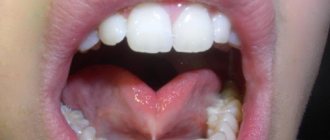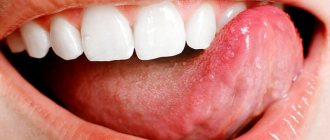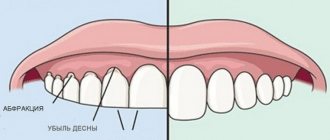Swelling of the tongue due to dehydration
Dry mouth is a sign of dehydration, when organs and systems lack fluid. This happens if the body temperature rises or infectious diseases develop. This condition is typical for vomiting, diarrhea, runny nose, and poisoning. When the nose is stuffy, the patient breathes through the mouth. This causes drying of the mucous tissues. It happens that the tongue swells during sleep. This increase in size can cause suffocation. It is imperative to find out the cause in order to get rid of the pathology. To do this, you need to contact your dentist.
Causes
If a patient has a swollen tongue, the reasons can be very diverse, ranging from a banal injury to a severe allergic reaction. According to the cause, appropriate treatment is prescribed.
If the tongue swells very quickly and at the same time greatly increases in size, then this may be a symptom of a severe allergic reaction. In this case, you should act immediately, since the sensation of a swollen tongue may precede the development of anaphylactic shock. If no measures are taken, the patient may suffocate. So if you have a swollen tongue, allergies are the first reason you should think about.
With allergies, patients usually complain of the following symptoms:
- the tongue hurts and is swollen, as if it does not fit in the mouth;
- lips and tongue are swollen, it is difficult to talk and swallow;
- the papillae on the tongue became swollen, and the tongue itself became painful and sensitive;
- swollen at the base, which makes it difficult to swallow and breathe fully.
Another reason why a patient’s tongue is swollen may be injuries resulting from an incorrect bite, cut, or scratch with hard pieces of food. In this case, the patient usually complains that his tongue is swollen on one left or right side, that is, on the side on which he was injured. In this case, it is important to ensure the cleanliness of the oral cavity and prevent bacteria from entering the wound in order to prevent the occurrence of an inflammatory process.
- If the patient's tongue is swollen on the sides, especially when tooth marks are visible on the side surface, the doctor may suspect thyroid disease. In this case, it is necessary to refer the patient to study the level of thyroid hormones.
- If the patient has swelling under the tongue, this may be a consequence of taking sublingual drugs - those that dissolve under the tongue (validol, engistol and a number of other drugs). In this case, the swelling under the tongue usually goes away on its own after you stop taking the medications.
- Complaints that the tongue is swollen can also occur if the patient has injured the delicate epithelium with sharp pieces of food - for example, chips. In this case, the sensation will go away on its own after brushing your teeth or rinsing your mouth with a tooth elixir or balm.
- Some infections can also lead to swelling of the tongue, in particular streptococcal infection, herpes virus, candidiasis, syphilis. In this case, it not only swells, but also hurts, and small rashes, a dense white coating or ulcers appear on the surface of the mucous membrane, depending on the condition and neglect of the disease.
- The most dangerous reason for a sore throat and swollen tongue is cancer. It is quite rare, but still should not be discounted. Therefore, if the patient has no visible causes of tongue swelling, allergies are excluded, and his condition still does not improve, there is a reason to refer such a patient for a consultation with an oncologist.
Localization
Close attention is paid to the site of swelling. The varied nature of the disease harms a specific area of the muscular organ. If the root is affected, problems with the large intestine can be assumed. Pathology in the middle indicates improper functioning of the duodenum or small intestine, as well as the stomach. When imprints of chewing organs are visible on the sides, the patient is advised to balance the diet. More about this.
Along the edges
Is your tongue swollen around the edges? In such a situation, marks from the side teeth are visible on it. This most often occurs when a deficiency of nutrients in the body is diagnosed. Also, the edges are affected when problems with the thyroid gland occur. If water is retained in the body, there will also be dents on the sides of the organ. Most often this is diagnosed in diabetics, with inflammation or enlargement of the liver. It happens that this condition is typical for a diseased spleen, excess weight, and improper digestion.
On one side of the tongue
A symptom such as one-sided swelling due to a certain disease. It can be triggered by various factors: chronic diseases, bacterial or fungal infection, neoplasm, herpes virus and other ailments. It happens that one side swells as a result of injury. This could be a bite, burn, or surgery. Often Quincke's edema or allergies affect a specific area - an area on the right or left side.
Under the tongue
When swelling affects the area under the muscle organ, this most often indicates improper functioning of the salivary glands. Many provoking factors can lead to this condition. Among them are infection, mumps, sand in the salivary glands, HIV, herpes, influenza, poor hygiene, parainfluenza of both types.
Swollen after puncture
Many patients complain that their tongue is swollen after piercing. In most cases, this swelling is not pathological. The tongue was injured during the puncture process, and slight swelling is completely natural and natural. Therefore, it is necessary to strictly adhere to the recommendations of the specialist who performed the puncture, keep the oral cavity clean, and rinse your mouth with antibacterial drugs. However, if the swelling does not go away within 4-5 days, and purulent exudate forms at the puncture site, you should immediately consult a doctor, since various complications often arise with tongue piercing.
Normally, healing after a puncture occurs within two weeks. During this period, the tongue may swell, hurt, and the patient may experience a feeling of discomfort, burning, and soreness. In the future, all these unpleasant symptoms will disappear, and after two weeks the wound should heal without a trace, and the swelling should go away.
Swollen lips
As mentioned above, the tongue and lips most often swell at the same time due to allergies. In this case, swelling occurs rapidly, literally in a matter of minutes. Along with a swollen tongue, the patient may experience other unpleasant symptoms, such as a runny nose, sneezing, mild cough, vomiting and abdominal pain. If no measures are taken, then other symptoms may appear a little later - such as increased body temperature, changes in body color and sensitivity, and soreness and swelling of the tongue.
Many in this situation are lost and do not know what to do if the tongue is swollen and the patient apparently has an allergic reaction. You should not panic, you need to act quickly and clearly. You need to urgently call an ambulance, and before it arrives, give the patient an antihistamine, open the windows wide and provide access to fresh air, and avoid contact with the allergen (if known).
Diagnostics
To determine the cause of the tongue tumor and determine the need for therapy, the doctor conducts a comprehensive examination. First of all, the specialist finds out when and under what circumstances the symptom occurred.
The doctor also identifies the presence of an allergic reaction to drugs or food, chronic diseases. Associated symptoms are being studied.
As an additional diagnosis, laboratory tests of blood, feces and urine may be prescribed to detect infection. If thyroid dysfunction is suspected, a hormone test and ultrasound examination of the thyroid gland are prescribed.
Swollen throat
If the tongue and throat are swollen at the same time, this condition is life-threatening for the patient. In the vast majority of cases, this condition occurs during anaphylactic shock (the most severe manifestation of allergies). Only an experienced doctor can remove a patient from a state of anaphylactic shock, therefore, at the first signs of swelling of the tongue and throat, you should immediately call an ambulance, especially if the patient has other dangerous symptoms - such as difficulty swallowing, bluish coloration of the lips and nails, swelling of the eyes and lips, small rashes, low blood pressure, nausea, shortness of breath or choking.
What to do
If a patient has a swollen tongue, treatment primarily depends on what causes the swelling. First of all, the cause should be determined; only an experienced doctor can do this. If the cause is known and it is not life-threatening (for example, biting the tongue or being burned by too hot food), then you can try to relieve the unpleasant symptoms yourself. But if the cause of tongue swelling is an allergic reaction, self-medication is life-threatening.
There are many ways to relieve swelling using traditional methods. However, all of them are suitable only for cases where the cause of swelling is microtrauma of the tongue.
You can rinse your mouth with decoctions of medicinal herbs - chamomile, sage, calendula, eucalyptus. You can use baths and rinses made from chlorhexidine, various herbal balms and rinses. If the patient's tongue is swollen after tooth extraction, rinsing with herbal infusions will help. It should be remembered that in this case you should absolutely not rinse your mouth with hot infusion, it will only increase inflammation.
Treatment
For the most effective treatment and quick relief of the patient’s condition, the real cause of the swelling should be established. Let's consider treatment options depending on the causes of swelling:
- Swelling of the tongue caused by mechanical trauma usually goes away on its own within a few days. During this time, you should limit your consumption of spicy and hot foods and rinse your mouth with antiseptic solutions.
- If the swelling is caused by glossitis, first of all you need to relieve the inflammation. It is necessary to rinse your mouth thoroughly, take antibiotics and antifungal drugs.
- In the presence of infectious diseases, the underlying disease should be treated, and a swollen tongue as a concomitant symptom will go away on its own.
- In case of an allergic reaction, the patient should eliminate contact with the allergen as quickly as possible, give an antihistamine, a sedative, and call a doctor.
- In case of anaphylactic shock, call an ambulance immediately, as seconds may count.
- In case of metabolic disorders and thyroid diseases, the underlying diseases should be treated first of all. The swelling of the tongue will go away on its own as the patient recovers.
- For genetic disorders, treatment is symptomatic; the doctor may prescribe anti-inflammatory and antihistamine drugs to alleviate the patient's condition.
- In the presence of malignant tumors, treatment is carried out by an oncologist; it includes treatment of the underlying disease and relief of the patient’s condition.
- Very often tongue piercing . In this case, a small tumor is considered normal, because piercing is, in fact, the most common mechanical injury to the tongue. The piercing specialist must prescribe antibiotics and anti-inflammatory drugs to prevent the development of the inflammatory process. Swelling after a piercing usually goes away on its own as the wound heals.
Allergic
A swollen tongue due to allergies most often occurs after taking medications, as well as when eating certain foods. If the cause of swelling is a medication, you should immediately stop taking it and replace it with another drug. In parallel, antihistamines and calcium supplements should be prescribed.
If you are allergic to food, you should do the same - stop taking foods that cause allergies, start taking antihistamines.
You can also use folk remedies against allergies. However, it should be remembered that swelling of the tongue and lips, swelling of half the tongue, as well as swelling under the tongue can cause suffocation, so self-medication should be done very carefully and only in cases where the swelling is small and does not make breathing or swallowing difficult. In all other cases, you should consult a doctor immediately.
The most effective folk remedy is rinsing the mouth with a decoction of sage, calendula or chamomile. They have an antibacterial effect and help calm the inflammatory process.
Juice from raw potatoes also helps reduce swelling. You should rinse your mouth with freshly squeezed juice.
Angioedema
Angioedema is of allergic origin and develops extremely quickly, sometimes in a matter of seconds. This is the most dangerous of all types of edema, as it often spreads not only to the tongue, but also to the larynx, causing attacks of suffocation.
With angioedema, not only the tongue often swells, but also the face, cheeks, lips, and eyelids. The patient's skin becomes bluish and the eyes begin to water.
If swelling spreads to the pharynx and larynx, it can cause asphyxia. The patient experiences difficulty breathing, to the point of being unable to breathe on his own. In this case, it is necessary to perform a tracheostomy or intubation. Since only a qualified doctor can do this, at the first sign of rapidly developing swelling of the tongue or face, you should immediately call an ambulance. Before her arrival, the victim should be given antihistamines, preferably administered intravenously. The airways should be cleared of accumulated mucus, facilitating easier breathing. The victim's head should be slightly elevated to avoid blocking the airway with a swollen tongue.










